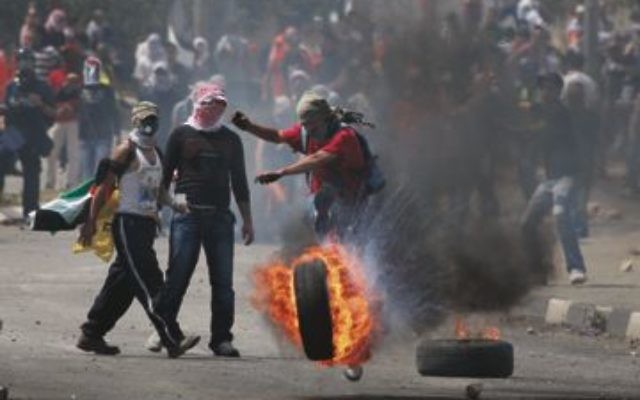Hunger strike deal quells Naqba day violence
AT the eleventh hour, just prior to Palestinians marking the angriest day of their year, Israel managed to quell explosive tensions with security prisoners and end a mass hunger strike.
An estimated 1500 Palestinian prisoners had been refusing food since April 17. Some prisoners had not eaten for longer – two of them for more than two months. But with Naqba Day – the Palestinian day to commemorate the displacement of Arabs during Israel’s establishment in 1948 – about to begin the following morning, fuelling Israeli fears that the situation could turn violent, Israel reached a deal to end the strike on Monday.
Following the agreement, Naqba Day went off relatively calmly, with large protests across the West Bank and a few clashes between demonstrators at checkpoints but no major incidents.
“There’s no doubt that we went the extra mile because we had a personal request from the Palestinian President, and because we didn’t want to see someone kill themselves,” a senior Israeli official told The AJN.
Palestinians are jubilant at the concessions they received in return for ending the strike. Hanan Ashrawi, an influential member of the Palestine Liberation Organisation, put out a statement calling it “a victory not only for them and their families, but also for the millions of Palestinians living in the occupied Palestinian territory and in exile”.
But Israel says that it secured an important gain, in the form of a guarantee that prisoners will not further plan the cause of terrorism from inside jail – and an understanding that they will lose their concessions if they do. “The Palestinians are saying that it’s a victory, but from our point of view it was not a bad solution,” said the Israeli official. “We had a problem until now that from inside Israeli jails terrorists were coordinating attacks on Israeli citizens.”
Israel demanded that all strikers sign a guarantee that they will “not carry out any security activity inside Israeli prisons”. The document stated: “Security activity in this regard includes recruiting people for terrorist missions, guidance, coordination, assistance and any other act that entails the realisation of practical support for terrorist activity against the State of Israel.”
Sivan Weizman, spokeswoman for the Israel Prisons Authority, told The AJN that the deal has begun to be implemented in jails. She said that all security prisoners who are currently in solitary confinement will be moved during the week to be held with other prisoners. She also confirmed that in another concession, arrangements are being made for Palestinians who live in Gaza and have relatives in Israeli prisons to start making visits.
The other major concession won by strikers was a guarantee for prisoners being held without charges or trial. Israeli law allows Palestinians to be held under these terms for up to six months, but strikers were promised that prisoners currently being held under these terms will not have their terms renewed without fresh information or evidence being brought before a military judge. In relation to the day-to-day conditions in prisons, a committee will examine possibilities to make improvements.
In a confidence-building gesture to Palestinian President Mahmoud Abbas, which does not feature in the agreement with prisoners, Israel is to dispatch to Ramallah the bodies of 100 terrorists who were killed in the course of their attacks.
The prisoner deal and promise to return the terrorists’ bodies came just 48 hours after Isaac Molho, the special envoy of Prime Minister Benjamin Netanyahu, met in Ramallah with Abbas. He delivered a response to Abbas’s letter from last month regarding the peace process. Though the contents of Netanyahu’s response letter have not been released, it is believed to have contained a pledge to create a demilitarised Palestinian state – the first time that Netanyahu has made such a promise in writing.
Molho and Abbas released a statement after the meeting saying: “Israel and the Palestinian Authority are committed to achieving peace and the sides hope that the exchange of letters between President Abbas and Prime Minister Netanyahu will further this goal.”
At the meeting, Abbas asked for a solution to the prisoner strike and for the bodies. According to Israel, the quick response to Abbas’s requests shows that Israel is serious about making progress. The Israeli official who briefed The AJN described the actions as “tangible steps”, which he hopes will help to make it possible to “move forward in the peace process”.
NATHAN JEFFAY


comments